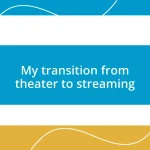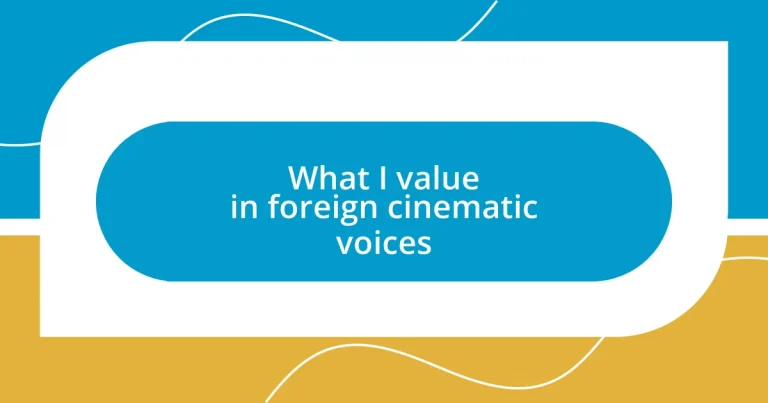Key takeaways:
- Understanding foreign cinematic voices enhances empathy and cultural appreciation, highlighting the unique narrative styles shaped by societal norms.
- Storytelling elements, such as pacing and visual metaphors, reflect cultural values and deepen audience engagement with films.
- International film festivals offer transformative experiences, fostering connections between diverse audiences and filmmakers while exploring complex global narratives.
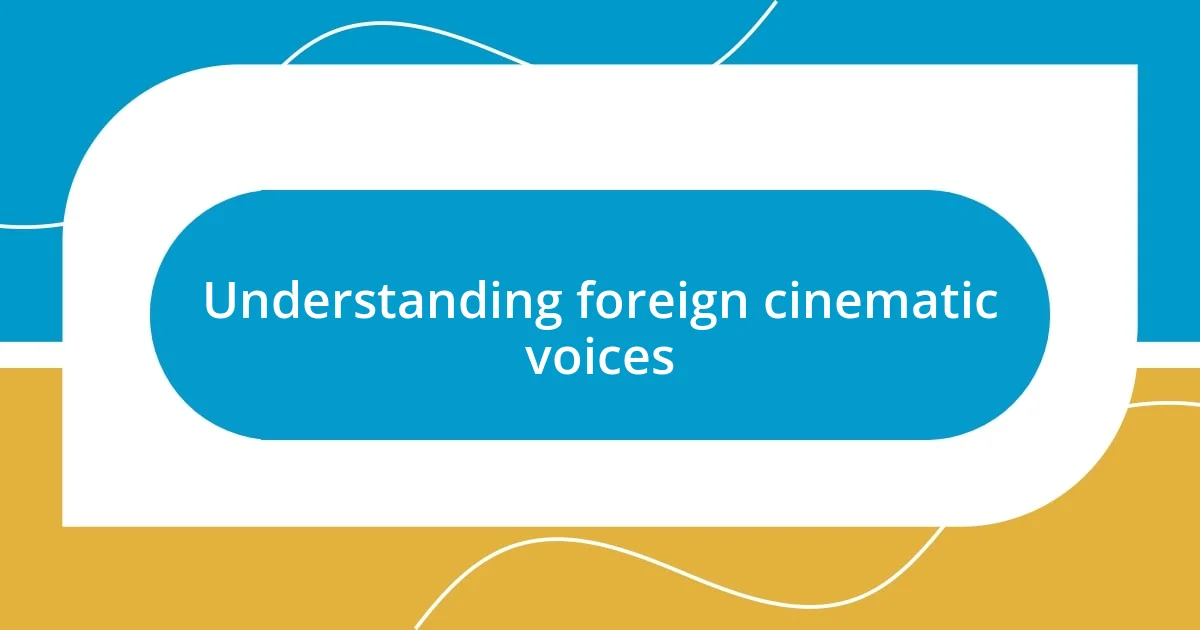
Understanding foreign cinematic voices
Understanding foreign cinematic voices means appreciating the unique cultural lenses through which stories are told. I remember watching a South Korean film that left me breathless. The nuances in the character’s emotions were so culturally specific yet universally relatable. How can a film from a distant land resonate so deeply? It’s captivating how different societal norms and value systems shape narrative styles and themes.
Every time I delve into a foreign film, I find myself on a journey of discovery. For instance, Italian cinema often intertwines personal stories with broader social issues, creating a rich tapestry of human experience. Have you ever felt a sudden connection to a character’s struggle, even if their reality is vastly different from yours? That empathy stems from the shared human experience, enhanced by the distinct flavors of a foreign culture.
I’ve noticed that subtitles can sometimes act as a barrier, but they also offer insight into the language’s rhythm and cadence. The way characters express love or grief varies; I distinctly recall a French film where silences were packed with emotion, conveying more than words could. Isn’t it fascinating how different languages wield their own expressive power? It’s a reminder that every cinematic voice carries the weight of its heritage and the pulse of its people.
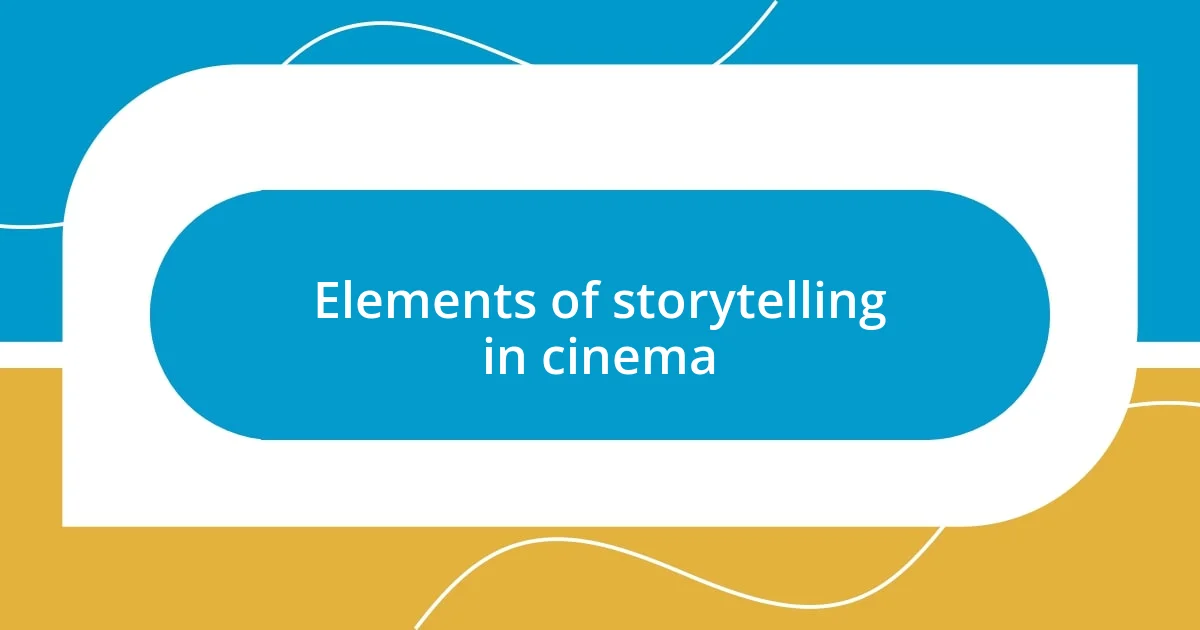
Elements of storytelling in cinema
When considering the elements of storytelling in cinema, one can’t help but notice how each film contributes to a larger conversation about identity and society. I’ve often found that the pacing of a story can reflect a culture’s values; for example, slower narratives in certain Indian films allow for deep emotional exploration. Isn’t it intriguing how a drawn-out moment can convey a lifetime of feeling?
Character development is another vital component that captures my attention. Take, for instance, a Japanese film I watched where the protagonist’s evolution is portrayed through subtle gestures rather than grand speeches. This minimalist approach can often pack a punch, pushing viewers to engage more actively with the character’s journey. Don’t you think it adds layers to the experience when filmmakers trust the audience to interpret emotions rather than explicitly stating them?
Lastly, the use of visual metaphors is a powerful storytelling device. While watching a Spanish film, I noticed recurring motifs of doors and windows, symbolizing opportunities and barriers. It made me reflect on my own life’s choices and the invisible walls we all face. Have you ever watched a film that made you reflect on your personal experiences in such a profound way? These cinematic elements remind us that storytelling is both a personal and shared journey, bridging gaps between cultures and experiences.
| Element | Description |
|---|---|
| Pacing | Reflects cultural values; slower narratives emphasize emotional depth. |
| Character Development | Minimalistic portrayal encourages active audience engagement. |
| Visual Metaphors | Symbolic elements prompt personal reflections and cultural insights. |
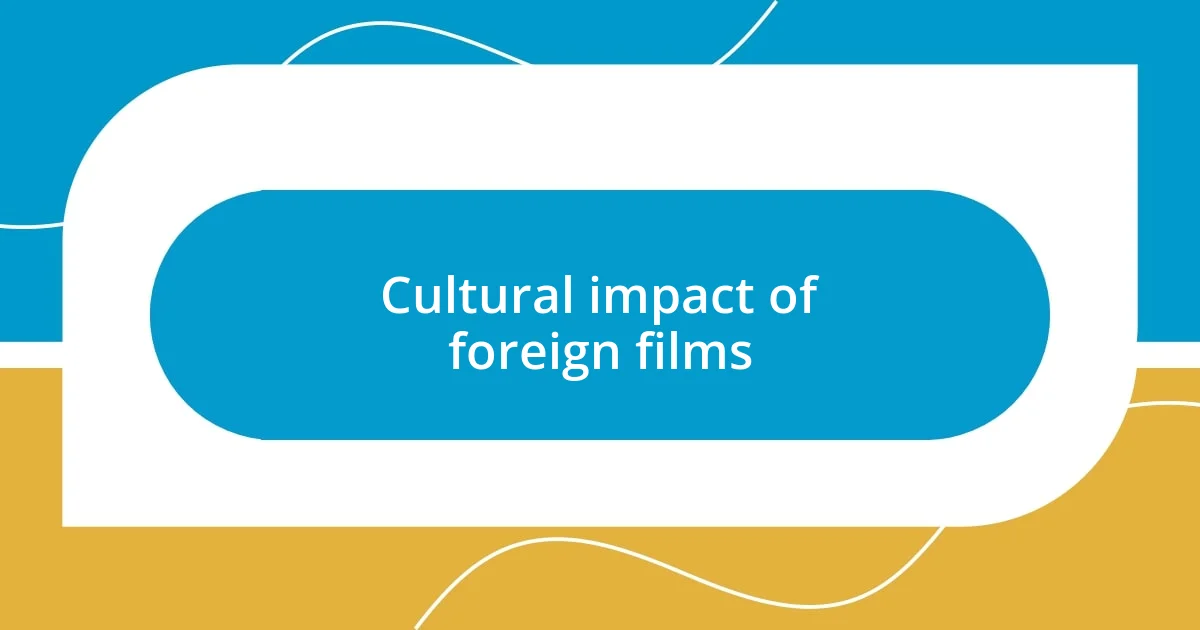
Cultural impact of foreign films
Foreign films wield a unique cultural power that can deeply influence our perspectives. I vividly remember the first time I watched an Iranian film. The simplicity of its storytelling, intertwined with profound social issues, opened my eyes to a world I barely understood before. It was like stepping into someone else’s shoes, allowing me to empathize with their struggles and joys. This shows how foreign cinema not only reflects a culture but also challenges viewers to reevaluate their own beliefs.
The cultural impact of foreign films extends beyond enjoyment; it’s about awakening curiosity and inspiring change. Here are a few specific effects I’ve noticed:
-
Cultural Understanding: Foreign films serve as a bridge, fostering comprehension of customs and traditions, which can sometimes seem foreign.
-
Social Awareness: They highlight social issues, prompting discussions that resonate beyond national borders. I found myself moved by a documentary that highlighted systemic injustices in Brazil, pushing me to engage in local activism.
-
Emotional Connection: These narratives often evoke emotions that transcend language, making us feel more connected to people across the globe. After seeing a heartbreaking Polish film, I found myself reflecting on family bonds and the sacrifices we make for loved ones.
-
Challenging Stereotypes: Foreign cinema often breaks down preconceived notions, presenting nuanced portrayals that challenge our assumptions about other cultures.
With each foreign film I watch, I’m drawn deeper into diverse worlds, teaching me the power of storytelling to connect us all.
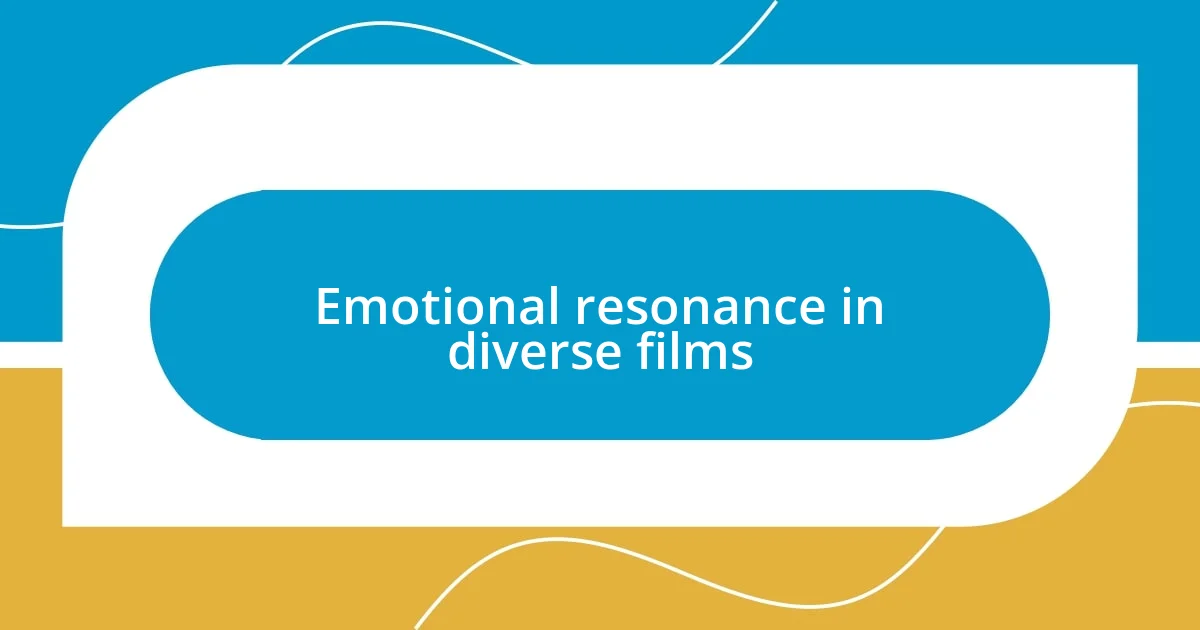
Emotional resonance in diverse films
While watching a film from Nigeria, I was captivated by a scene filled with raw emotion that left me breathless. The intensity on the characters’ faces expressed more than words ever could. I’ve often found that these moments resonate deeply, making me feel as though I am living through their experiences. Can a single glance convey a lifetime of sorrow? I believe it can.
In a Turkish drama I recently viewed, the interplay of grief and hope struck a chord within me. The protagonist’s struggle felt almost tangible, and I could sense my heart breaking alongside theirs. This kind of emotional resonance isn’t just entertainment; it’s a reminder of our shared humanity. How often have we felt someone else’s pain as vividly as our own? These films engage my empathy in ways that transcend language barriers.
There’s something profoundly moving about how different cultures express love and loss. I recall a poignant scene in a South Korean movie, where silence speaks volumes. Instead of grand gestures, it was a simple act of holding hands that conveyed a depth of commitment and care. Isn’t it fascinating that such understated moments can leave an indelible mark on our hearts? Those nuances enhance the storytelling, revealing the intricacies of human emotion in ways that feel familiar yet refreshingly new.
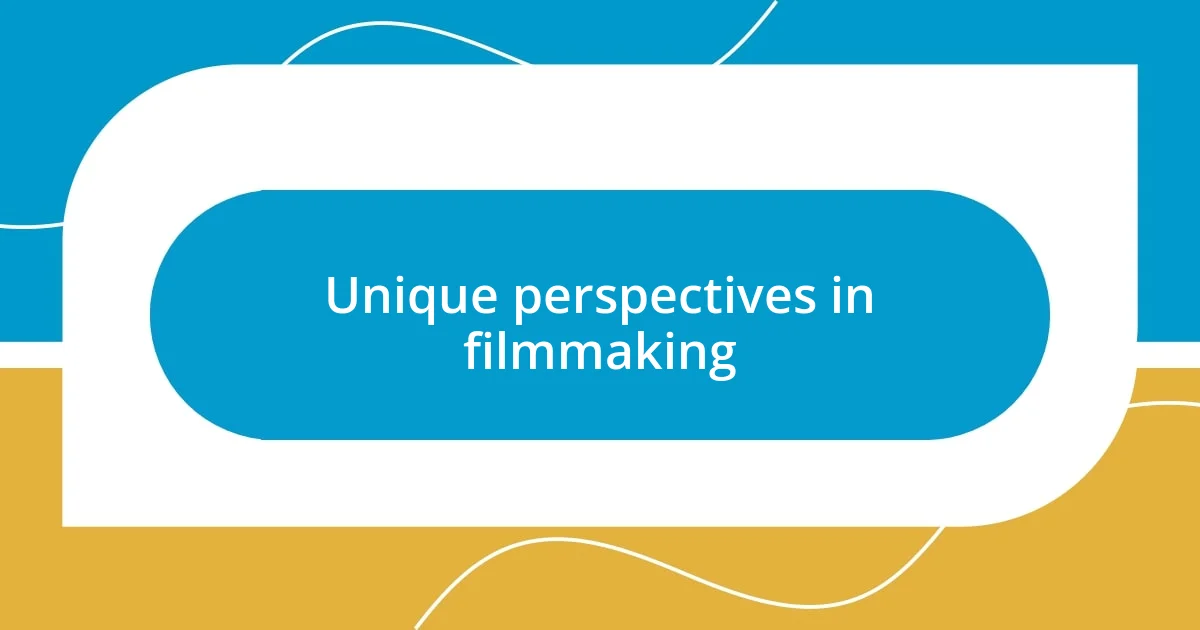
Unique perspectives in filmmaking
Filmmaking uniquely captures life through the lens of culture, offering viewpoints that often challenge mainstream narratives. I remember watching a French film that revolved around the complexity of love and identity, revealing how societal expectations shape relationships. This nuanced exploration made me reflect on my own perceptions of love – isn’t it fascinating how universal themes can manifest so differently across cultures?
Every time I engage with a film from a different country, I’m struck by how those unique cultural backdrops inform the storytelling. Take the time I viewed a Japanese animated film; its subtle blend of humor and existential themes was both whimsical and profound. It made me ponder how different cultural contexts influence humor and depth in storytelling. How often do we find ourselves laughing at something that simultaneously pulls at our heartstrings?
Unique perspectives in filmmaking also extend to the use of local landscapes and settings as vital characters in their own right. I’ll never forget the breathtaking views of the Himalayas in a Bhutanese film – they didn’t just serve as a backdrop but enhanced the narrative, grounding it in the rich spiritual journey of the characters. Isn’t it beautiful how the geography of a place can mirror the emotional landscapes of its people? Each frame felt intentional, inviting me to immerse in an experience that’s both foreign and relatable.
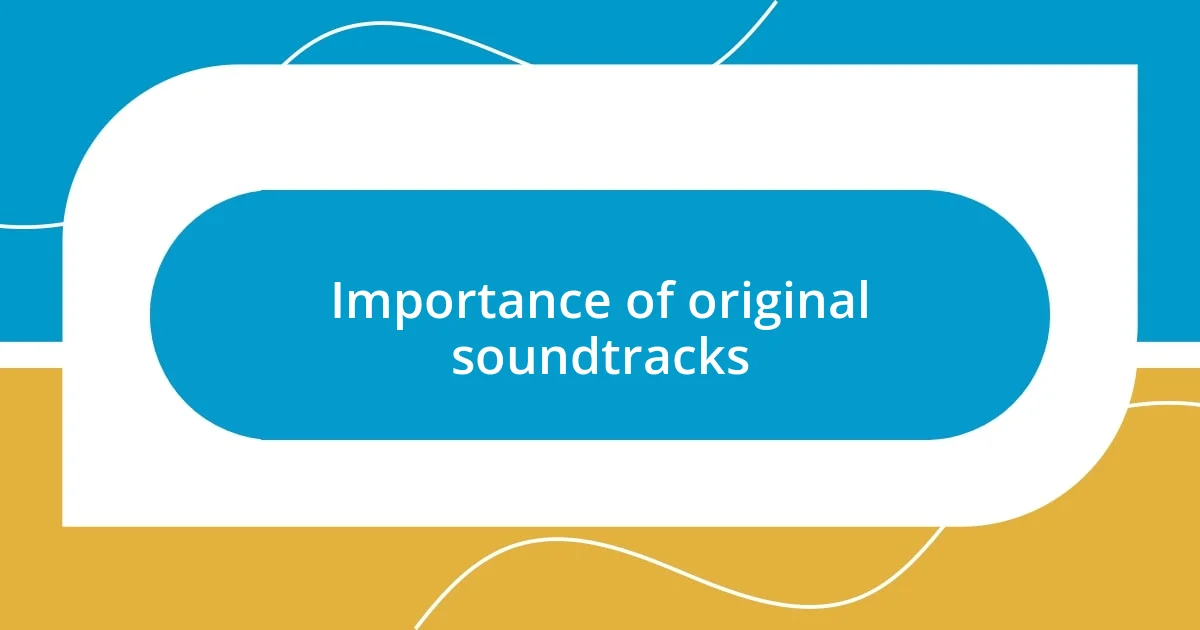
Importance of original soundtracks
Original soundtracks play a pivotal role in shaping the emotional landscape of a film. I remember the first time I heard the haunting melody of a Danish film; it lingered long after the credits rolled, almost as if it were resonating within me. Isn’t it fascinating how music can evoke memories or feelings we thought were buried deep? A well-composed soundtrack amplifies the visuals, enhancing the emotion without overshadowing the narrative.
When watching a Brazilian film, I noticed how the lively samba rhythms created an infectious energy that perfectly matched the characters’ joy and struggles. This combination made engaging with the story feel like participating in a vibrant celebration of life. Can you feel the rhythm influencing your emotional connections too? I’ve realized that a soundtrack can often communicate what words cannot express, bridging gaps between cultures and contexts in a way that resonates universally.
Then there are those unforgettable moments when the music shifts, drawing us into the depths of a character’s struggle or triumph. I vividly recall the tension in an Indian drama heightened by a swelling orchestral score. It was as if the music mirrored my own heart’s frantic pace during the scene. How does a single piece of music manage to pull at our heartstrings like that? The answer lies in the power of original soundtracks to resonate with our deepest emotions, creating a bond between us and the stories unfolding on screen.
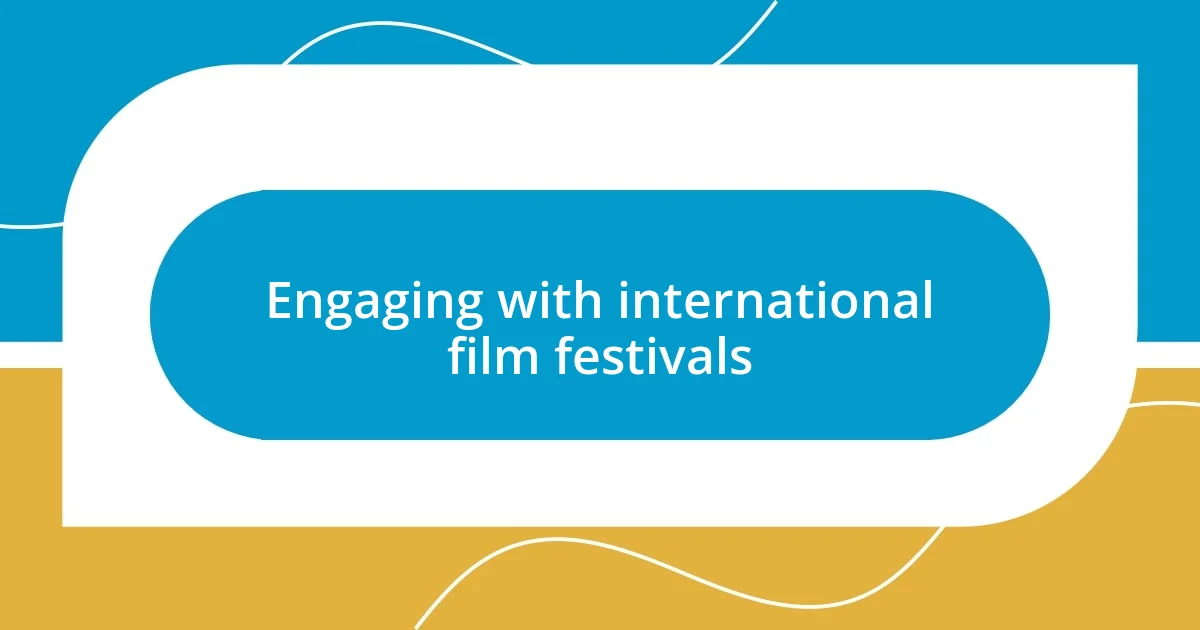
Engaging with international film festivals
Engaging with international film festivals has been a transformative experience for me. I can still remember the electrifying atmosphere of walking into a screening for an up-and-coming filmmaker from South Korea; the energy was palpable, as diverse audiences shared their anticipation. What struck me most was how the festival platform allowed these voices to resonate beyond their borders, fostering a collective appreciation for the complexities of global storytelling.
Attending panels and discussions during these festivals is an enlightening experience in its own right. I recall a particularly engaging session focusing on the impact of cultural identity in film. The conversation helped articulate questions I hadn’t considered before: how does a filmmaker’s background influence their narrative choices? It’s refreshing to hear filmmakers articulate their artistic intentions directly, providing deeper insights that enrich my viewing experience and inspire my personal understanding of cinema.
What really fascinates me is the opportunity to connect with filmmakers after screenings. At one festival, I had the chance to speak with a director from Argentina whose film tackled social injustice. Hearing the passion in their voice as they explained the inspiration behind their work made the story I had just witnessed feel even more powerful. Isn’t it incredible how these personal interactions can bring a new dimension to the film, making it not just a story told on screen, but a powerful dialogue connecting us all?









